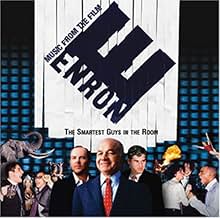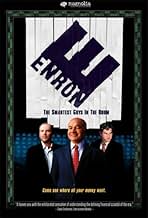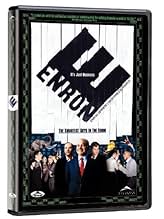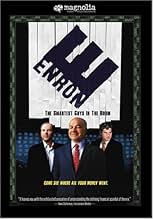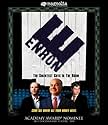Enron: The Smartest Guys in the Room
- Episode aired Oct 13, 2005
- R
- 1h 49m
Corporate audio and videotapes tell the inside story of the scandal involving one company's manipulation of California's energy supply and its, and how its executives wrung a billion dollars... Read allCorporate audio and videotapes tell the inside story of the scandal involving one company's manipulation of California's energy supply and its, and how its executives wrung a billion dollars out of the resulting crisis.Corporate audio and videotapes tell the inside story of the scandal involving one company's manipulation of California's energy supply and its, and how its executives wrung a billion dollars out of the resulting crisis.
- Director
- Writers
- Stars
- Self
- (archive footage)
- Self
- (as Jim Chanos)
- Self
- (archive footage)
- Young man the stripper dances in front of
- (as Reggie Deets II)
- Director
- Writers
- All cast & crew
- Production, box office & more at IMDbPro
Featured reviews
In the eighties we called people like the Enron Executives "Masters of the Universe." Now we can call at as we see it, Over grown former nerds with no morality and no conscience.
.
The film's strength is in its portrait of the massive "group think" inside and outside of the corporation that supported Enron's rise. It is astounding and chilling to look back on the cheer leading role played by banks, financial media, accounting firms and government. And though Enron, the film, may be weak on explaining how the company built itself up from a simple gas pipeline business to a post-modern corporate megalith, it was probably a wise choice to leave detailed descriptions of the financial manipulations to the book of the same name. The film, does though, miss an opportunity early on to provide a basic explanation of the central paradox of Enron -- earning heaps of money by exploiting commodities trading and accounting methods, while losing heaps of money in real world ventures. Enron set up its first commodities trading desk to capitalize on inside knowledge of the gas business, and then tried to replicate this model with water, broadband, electricity, etc. In actually a trading firm, Enron evaded investment firm regulations by portraying itself as an industrial firm.
Yet, despite some shortcomings, the storytelling is powerful, especially the eye-opening dramatization of Enron's role and the political manipulations behind the California energy-crisis. After viewing the suffering of average Californians, juxtaposed against the callousness of Enron's West Coast energy traders, it felt good to see Kenneth Lay walking in handcuffs.
More than once, the phrase, "this can happen again," echos in the film. It has happened before -- leveraged buyouts, the Savings and Loan crisis, the burst Internet IPO bubble, the 1920s Stock Market crash. A new financial vehicle generates untold riches for some, goes bust, and millions, sometimes billions ... disappear. Enron, the film, is the textbook on how one corporation recently stole from investors, employees and its "customers."
Ask why do we keep on letting this happen.
The Enron scandal was a tough one to understand, at least to me it was, because you could never quite figure out what Enron did. And director Alex Gibney breaks it all down matter-of-factly, never taking sides, never being judgmental, to show us what happened. Of course, he really doesn't need to be judgmental because the actions of Lay, Skilling and Fastow (and a few others) speak volumes.
Gibney's film very well could have been a convoluted mess. But he never loses sight of the fact that this is essentially a story about people. Not only the masters of the universe whose hubris eventually brought them down but, more importantly, the people whose livelihoods depended on what Lay, Fastow and Skilling did and who, unlike those three, didn't have millions to fall back on.
It's impossible not to feel incensed by what they did. Lay, Fastow and Skilling destroyed countless lives, yet they left with millions. There's a moment when Lay bemoans that his net worth dipped from $20 million to, I believe, $6 million. Yeah, tell that to the Oregonian utility worker, whose $340,000 nest egg was eventually only worth $1,200 after Enron stock tumbled in the wake of the scandal.
What's ultimately devastating about this film is listening to the tapes of Enron traders joking about how they were holding California hostage and letting people there suffer without electricity. These chaps are cold, callous and exemplify the Enron environment.
This is a fascinating film because it exposes these guys for who they are. And after listening to those interviewed in this film, it's impossible to believe Lay and Skilling were somehow oblivious to it all. How else could you explain why they insisted Enron employees invest in the company stock while they themselves were cashing out?
What's equally infuriating is realizing how Wall Street sucked up to Enron and how investment firms turned on anyone who dared to question Enron's power.
Of course, it's not surprising at all to see Lay's connections to the Bush family. But I am certain Dubya really didn't know very well someone he called "Kenny Boy." Just as, I'm sure, W's photos with Jack Abramoff mean absolutely nothing, either.
There's a moment in "Wall Street" when Bud Fox asks Gordon, "How much is enough?" And Gordon replies, "It's not a question of enough, pal. It's a zero sum game, somebody wins, somebody loses. Money itself isn't lost or made, it's simply transferred from one perception to another."
That's exactly what Enron did under Lay and Skilling. Except they did it on the backs of tens of thousands of hard-working Americans who lost pretty much everything. I can only hope the American justice system does right by all those workers.
Did you know
- TriviaAmong the protesters who disrupt the meeting with Jeff Skilling at San Francisco's Commonwealth Club is Marla Ruzicka, who was killed on 16 April 2005 in Iraq by a suicide bomber. She founded CIVIC (Campaign for Innocent Victims of Conflict) which worked to help the victims of the war in Iraq and she was a former Global Exchange activist.
- Quotes
Gray Davis: [upon being asked whether the rumors that he was responsible for the black outs in California are just a plot by the Republican party to get him recalled]
[shouts]
Gray Davis: Hello!
- Crazy creditsSpecial thanks includes "all the `Deep Throats' - you know who you are!"
- ConnectionsFeatured in 2006 Independent Spirit Awards (2006)
Details
- Runtime
- 1h 49m(109 min)
- Color
- Sound mix
- Aspect ratio
- 1.85 : 1


